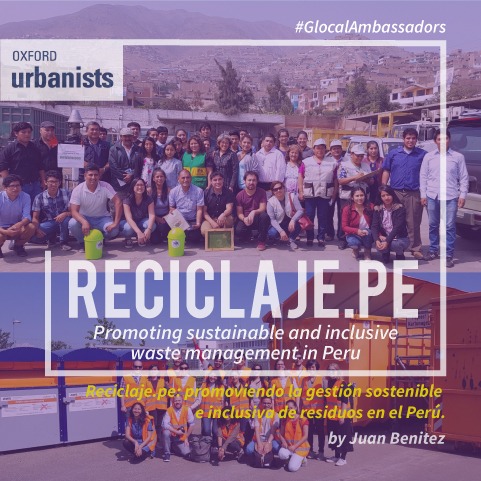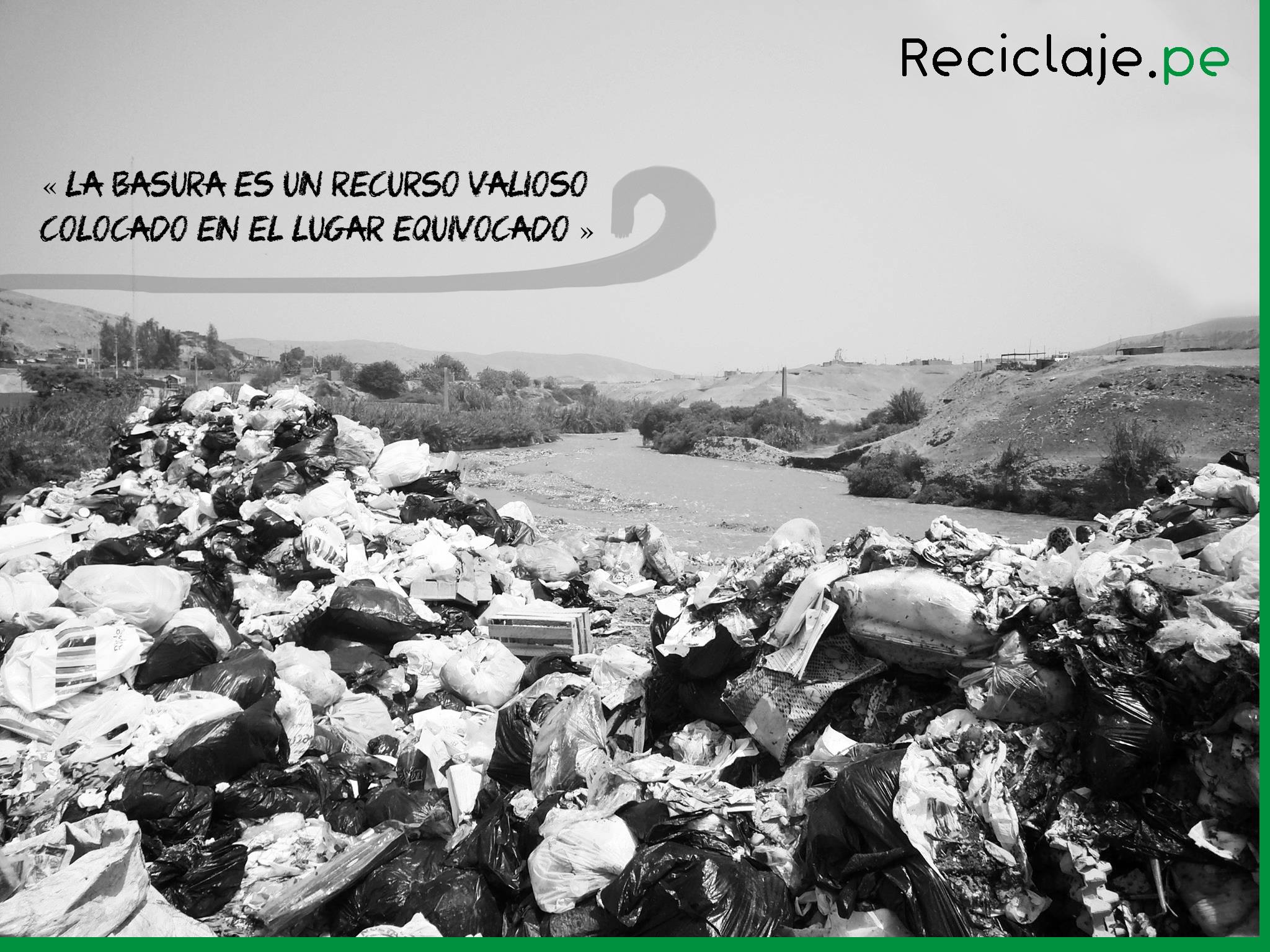Reciclaje.pe: Promoting Sustainable and Inclusive Waste Management in Perú. #GlocalAmbassadors
Photos via Reciclaje.pe
Dessire Velez is the co-founder of Reciclaje.pe, a Peruvian initiative focused on promoting sustainable and inclusive practices of waste management. Dessire splits her time between Germany and Perú.
In the latest OU Glocal Ambassador feature, we met with Dessire to learn about her initiative and what has brought her to this moment.
Dessire Velez comes from the Andean region of Perú and trained as an architect at the Catholic University of Lima. Beginning in her time at university, Dessire had collided with the poor ecosystem protection and waste management present in Lima. After participating in an academic exchange at the University of Stuttgart, in Germany, she identified key differences between Peruvian and German culture in the way in which ecology is protected in cities and how, in the case of Germany, landscapes, nature and waste management and reuse are embedded within urban planning and operations. Her experience in both contexts, along with her new academic tools, led her to think that this was something that should and could change in Perú. Her senior project focused on the design of an Inclusive Recycling Center in North Lima. This would be the beginning of an idea that eventually turned into Reciclaje.pe.
“Trash is a valuable resource, located in the wrong place”. Source: Reciclaje.pe
THE PROBLEM
Recycling in Lima, and in most Latin American cities, depends largely on informal systems. Thousands of informal recyclers work day and night in often deplorable conditions, and the benefits of their work for cities remains unrecognized by many governments across the region. This leads to a large number of recyclers not being covered by social or medical security systems and earning very low salaries.
Despite not being a country as consumerist as most European ones, the problem of waste management in Perú is very visible since, for example, there are no landfills in the Peruvian Amazon. The difficulty of taking all the waste to Lima, the capital, for its disposal means that in most cases it is burned in the open, increasing the emissions of polluting gases and completely wasting its reuse potential. In the peripheries of Lima the problem is also exacerbated, since most of the waste from the city center is taken there and the districts have fewer resources to deal with it.
Around 2011, the Peruvian Government was already looking to formalize recyclers through the promotion of business cooperatives. In addition, the government saw waste as a raw material and as a form of financing. Even though this resulted in very positive changes for informal workers, it left many challenges to be solved before effective solutions could be implemented. One of them was to engage informal recyclers who already had “vicious work chains” that worked well, to teach them new and different ways to use waste. At this point, Dessire found great potential and that was where the idea and target audience for her initiative came from.
Lima’s Comas district is home to 500,000 inhabitants and is located on the northern periphery of the city - the most populous and a highly informal area of the capital. Its low socioeconomic conditions, waste management issues and social and physical vulnerabilities are worsened by the immense inequality of the city. Comas presented an ideal case study for Dessire’s plans.
THE IDEA
Dessire’s objective was to build an Inclusive Recycling Center in North Lima’s Comas district. The Center would be comprised of two key functions: an open recycling center and a transfer center, to which small trucks arrive with waste that is then taken to larger treatment centers, optimizing resources and pick up times inside the city. Moreover, it would have three main approaches: Inclusion to reinforce the informal structures that already exist in the city; education for recyclers, in new and different forms of waste reuse and utilization, and support to municipalities to learn to recognize the informal dynamics of recyclers and promote partnerships for mutual benefit.
This is how Reciclaje.pe was born; a multidisciplinary team of young Peruvian and German professionals from disciplines such as Mechanical, Environmental and Industrial Engineering, Geography and Architecture working together, from Perú and Germany, to achieve the idea of efficient and equitable recycling and waste management.
Faced with a challenge of such magnitude, they began with small steps that are bearing fruit today. The first one was to obtain the sponsorship of the University of Stuttgart to carry out a simultaneous workshop in Comas and Stuttgart and through which the team hoped, in Dessire’s words, “to start the idea, to include recyclers and different municipalities in order to share their experiences, their risks, to start an exchange”. According to her, “the municipality of Comas was immediately up to it, the common objectives were recognized and the joint work began quickly”. They had the advantage of having previous studies from her master’s thesis and having an ally, Dr. Leoncio Sicha Punil, inside the municipality, who supported and advised them from the beginning. Also, because the team of professionals are connoisseurs of Peruvian reality and also trained in Germany, they are all willing to put themselves at the service of Lima.
Parallel workshop between Comas district in Lima, Perú and Stuttgart, Germany. Source: Reciclaje.pe
Workshop with local community, recyclers and officials in Comas district. Source: Reciclaje.pe
Recently, they have partnered with Precious Plastic, a Dutch initiative defined as a “global community of hundreds of people working to solve plastic pollution” and that shares open online tools, knowledge and techniques for plastic uses in any environment and context. With Precious Plastic, and with the sponsorship of the German Corporation for International Cooperation (GIZ for its acronym in German), Reciclaje.pe will carry out the first pilot of its project in the district of Comas, building a recycling center initially focused on plastic reuse. While implementing this first stage of the project, they will continue to work on convincing other relevant actors for the construction of the transfer station, highlighting its profitability and its openness to the public.
Dessire acknowledges that the road has not been easy. Some of her biggest challenges have been building trust within official bodies with decision-making power, as well as working in an international environment, long-distance and with volunteers. The alliances achieved with the Catholic University of Lima, the University of Stuttgart and the municipality of Comas have been fundamental in this process to build trust and obtain the necessary technical support.
At the same time, she is aware of the benefits that come from knowing well the context because, as she explains, “if the projects depend on people who do not know the context, the risk that they are not implemented is very high. That is why we are all confident. People know that we are Peruvians doing this because we really want to, we have done it voluntarily for years… and here [in Germany] people are also confident because they know that what we are going to do makes sense in Perú.”
If you wish to know more about Reciclaje.pe or contact them, visit their Facebook page or their website.
Juan Sebastián Benítez B., Latin America Coordinator for Oxford Urbanists, holds a MSc. in Integrated Urbanism and Sustainable Design from the University of Stuttgart, Germany. He is also a Civil Engineer from Los Andes University, Colombia. Through his academic and professional career, he has channeled his efforts and capabilities towards more just and livable cities.




